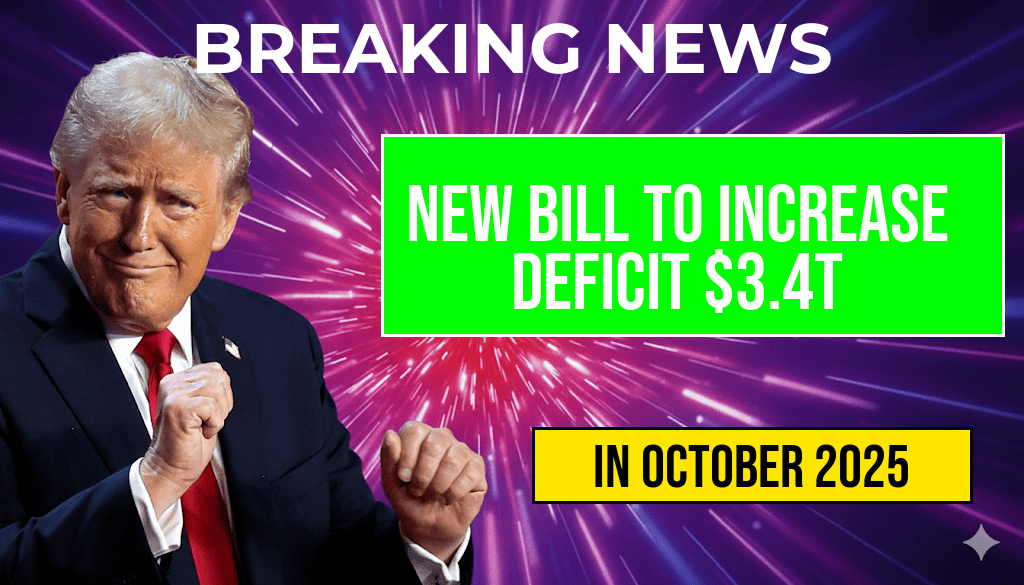Taxpayers are being urged to pay close attention as Congress prepares to vote on what proponents have dubbed the “One Big Beautiful Bill,” a sweeping legislative package estimated to increase the federal deficit by $3.4 trillion over the next decade. This ambitious proposal includes significant investments in social programs, infrastructure, and green energy initiatives aimed at stimulating the economy and addressing pressing societal needs. However, critics are raising alarms about the long-term fiscal implications, arguing that such an increase in deficit spending could have far-reaching consequences for the nation’s economic stability.
The Proposal’s Key Components
The proposed legislation encompasses a broad array of spending measures designed to enhance public services and promote economic growth. Key elements include:
- Infrastructure Investments: Significant funding allocated for repairing roads, bridges, and public transit systems.
- Healthcare Expansion: Increased funding for Medicare and Medicaid, aimed at improving access to healthcare for underserved populations.
- Green Energy Initiatives: Incentives for renewable energy development, including solar and wind projects, to combat climate change.
- Education Funding: Support for public education systems, including increased teacher salaries and resources for students.
Projected Economic Impact
Supporters of the bill argue that the upfront costs will be offset by long-term economic gains. They contend that investing in infrastructure and social programs can lead to job creation and increased productivity. According to a report from the Forbes, proponents believe that every dollar spent on infrastructure projects could yield $2.50 in economic growth over time.
Concerns About Deficit Growth
Despite the optimistic projections from supporters, many economists and fiscal watchdogs are sounding the alarm over the potential for escalating national debt. The federal deficit has already reached historic highs, and adding another $3.4 trillion could further strain the country’s financial resources. Critics warn that this legislative package may lead to higher taxes in the future and could limit the government’s ability to respond to economic crises.
Political Landscape
The “One Big Beautiful Bill” has sparked intense debate within Congress. While Democrats largely support the initiative, viewing it as a necessary step toward social equity and economic revitalization, many Republicans are staunchly opposed. They argue that the bill is fiscally irresponsible and could jeopardize the nation’s financial health. As the vote approaches, both parties are ramping up their lobbying efforts, with each side eager to sway public opinion.
Public Sentiment
Public opinion on the bill appears divided. A recent poll indicates that while a majority of Americans support increased spending on infrastructure and education, there is significant concern about the growing deficit. Many taxpayers are wary of policies that might lead to future tax increases. Economic uncertainty stemming from inflation and interest rate hikes is further complicating the conversation.
The Path Forward
As Congress deliberates, the implications of this massive spending package will continue to be a focal point of national discourse. With the potential to reshape the economic landscape, both supporters and critics of the bill are preparing for a heated debate as they advocate for their respective positions. Observers are closely monitoring the proceedings, acknowledging that the outcome will have lasting effects on American taxpayers and the economy as a whole.
Conclusion
The “One Big Beautiful Bill” represents a significant shift in fiscal policy, aiming to balance immediate social needs with long-term economic stability. As the legislative process unfolds, taxpayers are advised to stay informed about developments that could impact their financial future.
Frequently Asked Questions
What is the ‘One Big Beautiful Bill’?
The ‘One Big Beautiful Bill’ refers to a proposed legislative package that aims to implement significant changes in various sectors, including taxation and social programs.
How much is the bill expected to increase the deficit?
The bill is projected to increase the deficit by approximately $3.4 trillion, raising concerns about its long-term impact on the economy.
Who will be affected by the proposed changes in the bill?
The proposed changes in the bill could affect a wide range of individuals and businesses, particularly those involved in tax-related issues and public services.
What are the potential economic implications of increasing the deficit?
Increasing the deficit can lead to higher interest rates, reduced government spending in other areas, and potential inflation, which may have long-term consequences for taxpayers.
When is the bill expected to be voted on?
The exact date for the vote on the ‘One Big Beautiful Bill’ has not been confirmed, but it is anticipated to occur in the upcoming legislative session.

Leave a Reply